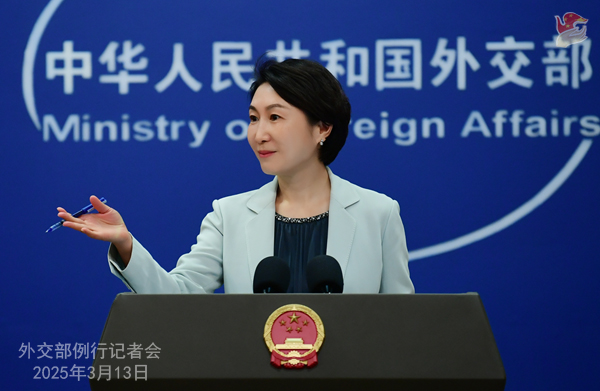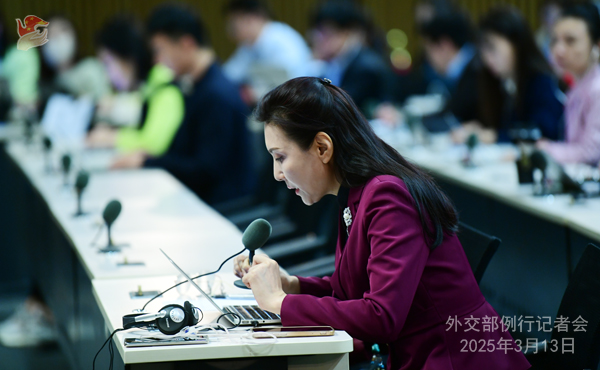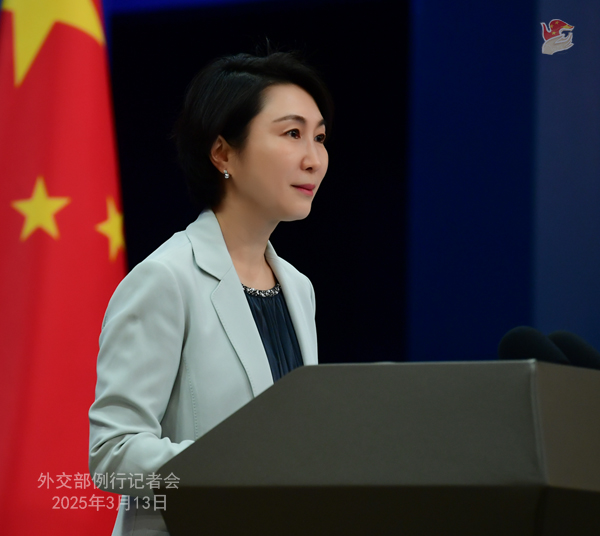
CCTV: We noticed that a series of major foreign investment projects have been launched in China this year, with a total investment volume of US$33 billion. Commentators say foreign companies are increasing their investment in the Chinese market with concrete actions. However, some say statistics show that foreign investment in China has dropped in recent years, indicating a trend of “foreign capital leaving China”. What’s your comment on this?
Mao Ning: We have received similar questions from other journalists recently. Here I would like to share some of the latest statistics from authorities with you. By the end of last year, nearly 1.24 million foreign-funded companies have been established in China, with paid-in foreign capital reaching RMB 20.6 trillion. Last year, some 60,000 foreign-invested companies were newly established in China, up by 9.9 percent year-on-year. In the past five years, the rate of return on FDI in China is nearly 9 percent, ranking among the top across the globe. Statistics show that China remains an ideal destination for foreign investment and many foreign companies are optimistic about China’s growth prospects.
Last month, China issued the 2025 Action Plan for Stabilizing Foreign Investment, putting forward 20 new measures on expanding self-initiated opening-up in an orderly manner and boosting foreign investment. It is put forward clearly in this year’s government work report that we will ensure national treatment for foreign-funded enterprises in fields such as access to production factors, license application, standards setting, and government procurement, thus enabling foreign-funded enterprises to achieve even greater business success in China.
Partnering with China will bring more opportunities. No matter how the external environment may evolve, China remains firmly committed to high-standard opening up and always welcomes companies from all countries to keep investing in China and explore the Chinese market to enjoy benefits and development together.
DPA: According to German media report, the German foreign intelligence service concluded based on their evidence that the outbreak of the worldwide coronavirus pandemic in 2020 could well have been triggered by an accident at a laboratory in Wuhan, China. What’s your comment? What’s China’s position on the COVID pandemic?
Mao Ning: We have stated China’s position on this issue for many times. We believe the COVID-19 origins-tracing is a matter of science, and the judgement should be made by scientists and the science-based spirit should be upheld. It is “extremely unlikely” that the pandemic was caused by a lab leak—this is the authoritative conclusion reached by the experts of the WHO-China joint mission based on science following their field trips to the lab in Wuhan and in-depth communication with researchers. The conclusion has been widely acknowledged by the international community, including the science community.
On the COVID-19 origins-tracing, we firmly oppose all forms of political manipulation.
Beijing Youth Daily: The Report on the Work of the Government noted that China offered unilateral visa waivers to more countries in 2024, thus bringing about a sustained surge in inbound tourism. Foreign Minister Wang Yi also pointed out when he met the press during the two sessions that more countries may join our visa-free “circle of friends”, sustaining the popularity of “China Travel” around the world. Can you give us more details on that?
Mao Ning: So far, China has granted unilateral visa-free entry to 38 countries and extended the transit visa-free period to 240 hours for 54 countries. In 2024, over 20 million foreign travelers entered China visa-free, up by 112 percent year-on-year. Among them, over 3.39 million came to China under the unilateral visa-free policy, up by 1200 percent year-on-year. Having been to China, many foreigners who thought of China as mysterious now find the country fascinating.
We will take more steps to make it easier to visit China and make foreign visitors feel more at home during their stay here. Some policies have been put in place. For example, Chinese embassies and consulates worldwide no longer require online appointment for visa application and now provide walk-in visa application services instead. Many cities are now piloting the policy of “Buy Now, Refund Now” for efficient departure tax refunds and provide easier payment access which allows foreign users to link their international credit cards to Chinese digital payment platforms.
Spring is a perfect time to visit China as it brings warmth and blossom of flowers. We welcome foreign friends to come and visit China and get a first-hand experience of this beautiful and open country as it is.

AFP: China will hold the Beijing meeting between China, Russia and Iran on the Iranian nuclear issue tomorrow. Can you brief us on China’s expectation on the meeting? Is the meeting open to foreign media? If not, why?
Mao Ning: As a permanent member of the UN Security Council and a party to the Joint Comprehensive Plan of Action (JCPOA), China calls for an appropriate resolution of the Iranian nuclear issue through political and diplomatic means, and efforts of safeguarding the international nuclear non-proliferation regime and promoting peace and stability in the Middle East. The Beijing meeting will be China’s latest diplomatic effort with the aim of enhancing communication and coordination and creating conditions for resuming dialogue and negotiation at an early date.
Under current circumstances, we believe that relevant parties need to remain calm, exercise restraint, and prevent the situation surrounding the Iranian nuclear issue from escalating or even descending to confrontation and conflict. China sincerely hopes that all parties can work in the same direction, continue to build trust and clear up misgivings, and turn the momentum of resuming dialogue and negotiation into reality at an early date.
On whether the meeting will be open to media, let me check and get back to you later.
Reuters: Taiwan president Lai Ching-te said today that China has deepened its influence campaign and infiltration against the island. He also said that China has used Taiwan’s democracy to absorb various members of society. How does the Ministry respond to this?
Mao Ning: Taiwan is part of China. There is no so-called president in Taiwan. What you mentioned is not a question on foreign affairs. What I can tell you is that no matter what they say, the DPP authorities cannot change the fact that Taiwan is part of China, and the trend that China must achieve reunification.
